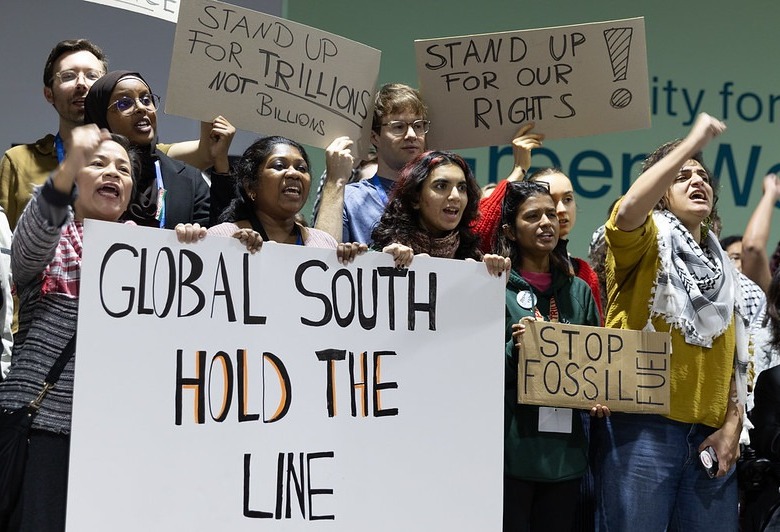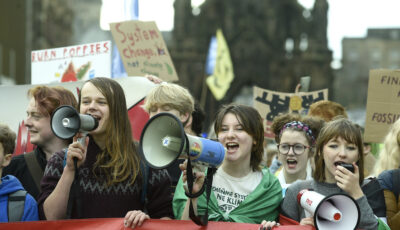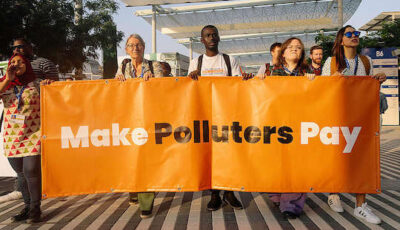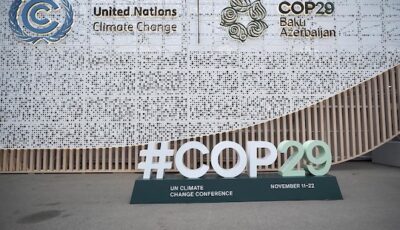The latest UN climate change summit was largely derided as a sham after failing its biggest test to date—committing to share resources among rich and poor nations for tackling the crisis.
Although it was the 29th meeting or COP (‘conference of the parties’), no other talks had specifically negotiated the funds needed to help developing countries decarbonise and cope with the effects of climate change. It may go down in history as the most decisive failure of all the COPs on global economic sharing.
The famous Paris agreement in 2015 made clear that the rich industrialised world is obliged to supply finance to developing countries under the principles of equity and historical responsibility. But this objective was always fraught with division. The previous goal of providing $100 billion per year by 2020 was set without real negotiation at Copenhagen in 2009, and wasn’t met until 2022. Even then, only about $30 billion of genuine public finance was actually received that year.
It wasn’t until the very last day of the two-week talks that rich countries put a new figure on the table, ultimately offering only $300 billion per year out of the $1.3 trillion needed by the Global South. That may sound like an impressive tripling of the previous $100 billion per year goal, but it is barely an increase when adjusted for inflation. And most of the money is unlikely to come in the form of grant-based finance, but rather as loans and private investment that will further deepen the debts of impoverished countries.
Once again, there’s no guarantee that any significant public money will be moved from the Global North to the Global South. This was the culmination of a decade of wealthy countries abdicating their responsibilities under the Paris Agreement, leaving developing countries themselves to cover most of the bill for climate-induced destruction that they are least to blame for. In future COPs, bitter battles still lie ahead for developed countries to make individual pledges of climate finance to show they are ramping up their efforts to meet this evasive goal.
The COP of false solutions
Instead of redressing the long overdue climate debt of Global North countries, the only meaningful outcome of the talks was to agree the scaling up of risky and unproven carbon markets. This side-stepped all the evidence that carbon markets do not reduce emissions and often lead to land grabs in indigenous communities, human rights violations and loss of biodiversity.
The new international framework for carbon markets trading is supposed to enable countries to meet their Paris Agreement commitments through carbon offsetting projects, while helping less wealthy nations to raise urgent climate finance. But campaigners say the decision will only provide a ‘get out of jail free’ card to Big Polluters, permitting them to continue profiting from the very crisis that they largely caused. It effectively turned the great ‘finance COP’ into the COP of ‘fossil-fuelled false solutions’.
From the start, it was an absurdity that COP29 was hosted in a petro-state, Azerbaijan, which had little experience of high-level climate talks. Activists were banned from chanting or marching outside the conference venue, and restricted to demonstrating inside a conference room. More than 1,700 fossil-fuel lobbyists heavily outnumbered country delegations, and Saudi Arabia led the way in trying to avoid any mention of fossil fuels in the final agreement. The host-country appeared to back these attempts to undermine last year’s COP28 landmark outcome on the need to ‘transition away from fossil-fuels’, however weak such a commitment remains.
In the words of the Global Campaign to Demand Climate Justice, the forcing through of this sham COP29 deal, over the fierce opposition of developing countries, ‘was nothing short of an authoritarian insult to the principles of equity and justice enshrined in the climate process’. This can only lead to a worsening of the climate crisis and a deepening of global inequity.
STWR supported the latest Civil Society Equity Review that again called out the Global North’s refusal to pay up on climate finance or support a just transition to clean energy. Supported by over 300 organisations and now marking its 10th anniversary, the report details the litany of failures since the 2015 Paris Agreement set out a global framework for action. Humanity’s cumulative emissions have more than doubled since the early years of the UN climate treaty. Fossil fuel consumption is rising and the rapid deployment of alternatives is still dangerously far off. No developed or rich country is anywhere close to making their ‘fair share’ of domestic mitigation effort, let alone their fair share of climate finance which is critical to global ambition.
What lies ahead
There is no mystery about how governments could rapidly mobilise this money on a sufficient scale—redirecting funding for fossil fuel subsidies; shifting military spending; taxing profiteers and polluters; and implementing innovative global finance mechanisms. Greenpeace estimate that a small tax on just seven of the world’s biggest oil and gas companies could grow the UN fund for loss and damage by more than 2000%. Climate campaigners also spell out how changing global rules on debt, taxes, trade and technology will significantly expand the fiscal space for Global South countries to finance their own transition.
This necessary transformation may seem far away as the Trump presidency is set to exit the Paris Agreement, roll back Biden’s clean energy policies and massively reinvest in oil, gas and coal. That may put the world on a cataclysmic climate trajectory, while heralding the end of climate assistance from the United States to developing countries.
Some hope remains for continuing negotiations around a just transition at COP30 in Brazil next year, hosted by the more climate-friendly Lula presidency. It’s billed as the most important climate summit since Paris where nations will set out their climate plans for the next 10 years. But it’s clear that the latest failures of the COP process only reinforces the need for vastly scaled-up social movements and mass protest actions, which is our last hope for compelling governments to rapidly shift towards zero carbon economies in response to a planetary emergency.
To repeat the key message of STWR’s book ‘The intersection of politics and spirituality in addressing the climate crisis’ by Mohammed Mesbahi:
We should now be protesting continuously around the world, not just once or twice each year or only during the Conference of the Parties. Total cumulative emissions have risen at an unparalleled rate in the new millennium, and …it is naïve or foolish to believe that world leaders will take effective mitigation action without immense pressure from the global public.
Image credit: UNFCCC




